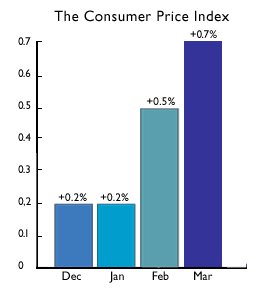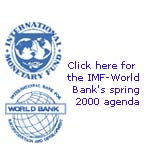|
Summers eyes balance
|
 |
April 16, 2000: 8:51 a.m. ET
Fundamentals, not turbulent U.S. equity markets, are the G-7's focus
By Staff Writer M. Corey Goldman
|
WASHINGTON (CNNfn) - Balancing the robust pace of the U.S. economy with the rest of the well-performing economies of the Group of Seven industrialized nations is the main focus of the G-7, not turbulent U.S. equity markets, U.S. Treasury Secretary Lawrence Summers said Saturday.
In a briefing to reporters following the Saturday release of a G-7 communiqué, Summers said the U.S. stock market, which took one of its worst dives in history at the end of last week, was not a significant point of discussion for finance ministers' and central bank officials' weekend meeting in Washington.
Rather, economic fundamentals - growth, inflation, employment, exchange rates and interest rates - are what Britain, Canada, France, Germany, Italy and Japan are focused on to ensure that the world's richest and strongest economies remain on track for sustained growth.
"Certainly there was reference to that (Friday's stock market plunge) but the focus of our discussions was on the fundamentals of our economies, what we could do together to develop and sustain economic growth," Summers said. "With respect to the stock market, our focus is not to focus on that."
Bright prospects
Summers' remarks came as the G-7 released their semi-annual communiqué - a point-by-point document that details discussions among their ranks and tells the public what major concerns and initiatives they're collectively working on. The meetings typically coincide with the International Monetary Fund and World Bank's meetings, which occur in the spring and fall.
 Ministers noted that the prospects for expansion in their countries "continued to brighten" since their last meeting. "Nonetheless, continued vigilance and further action are needed to promote a more balanced and therefore more sustainable pattern of growth among our economies," they said. Ministers noted that the prospects for expansion in their countries "continued to brighten" since their last meeting. "Nonetheless, continued vigilance and further action are needed to promote a more balanced and therefore more sustainable pattern of growth among our economies," they said.
They also talked about exchange rates - particularly the difference in value between the U.S. dollar and the euro, Europe's 1-1/2-year-old single currency now used among 11 different countries.
"We discussed developments in our exchange and financial markets," Summers said. "In this context, we emphasized our view that exchange rates among major currencies should reflect economic fundamentals. We will continue to monitor developments in exchange markets and cooperate as appropriate."
Inflation benign?
In the United States and Canada, the G-7 painted a glowing picture, with strong growth, low unemployment and contained inflation.

While Summers did acknowledge the unexpected 0.7 percent surge in consumer prices last month - a number that sent all three major U.S. equity indexes to post their worst one-day point loss ever - he said he believes the U.S. inflation outlook still looks positive, particularly with respect to wages and salaries.
"The inflation outlook does remain contained and unit labor costs (what it costs companies to employ their workers) continue to reflect he absence of inflation pressures," Summers said.
At the same time, he suggested that the personal savings rate, which currently rests at an all-time low in the U.S., needs to be higher, something that can be encouraged by raising interest rates further.
As for the other G-7 countries, Britain received a good report card, with the G-7 noting that growth and employment had both strengthened in the last six months in an environment of low inflation. "Monetary policy should continue to be aimed at meeting the inflation target while sustaining growth and employment," ministers said.
Japan: keep rates low
And within the 11-member euro zone, the G-7 said potential for further growth going forward remains extremely promising.
"Going forward, sound macroeconomic policies and reforms directed at expanding investment, employment and productive potential remain important as to foster growth," the ministers said.
 As for Japan, whose economic woes have remained largely on the backburner at this week's meetings, the ministers said the economy has "not yet achieved a secure recovery in private demand," meaning interest rates at nil haven't yet encouraged people and companies to borrow money and stimulate growth. Japan's economy slipped back into recession last quarter. As for Japan, whose economic woes have remained largely on the backburner at this week's meetings, the ministers said the economy has "not yet achieved a secure recovery in private demand," meaning interest rates at nil haven't yet encouraged people and companies to borrow money and stimulate growth. Japan's economy slipped back into recession last quarter.
But Japanese officials told their colleagues they will keep their zero interest-rate policy "to provide ample liquidity to ensure that deflationary concerns are dispelled."
They also pledged to continue structural reforms to improve their banking system and increase their economy's productive potential.
Japan aside, the ministers agreed that keeping an eye on the progress of their economies and raising interest rates where necessary to contain growth and keep inflation in check would remain a priority.
At odds
That was at odds with the G-24 ministers, another group of ministers representing the world's developing nations, who strongly indicated that higher rates in developing countries could harm their prospects for economic growth through the rest of the year.
 The ministers painted a positive picture for Russia, not a member of the G-7 but a part of their semi-annual discussions. The ministers painted a positive picture for Russia, not a member of the G-7 but a part of their semi-annual discussions.
According to the ministers, Russia's economy has strengthened significantly in the past year and is now in shape to move forward with reforms that had been held up in the recent past by corruption. "There was a sense in the group that this was an important opportunity in Russia," Summers said.
At the same time, the group encouraged Russia to clean up corruption and work with the IMF to implement reforms that will encourage international investors to come back to the country and invest. The IMF suspended aid to Russia last year in the wake of allegation that funds had been diverted to illegal activities - namely money laundering.
IMF gets knuckle-wrap
But the main focus of the group was the IMF and its role on the international scene as a lender of last resort.
In a surprisingly candid critique of the fund, the ministers agreed that the IMF's role should focus more on taking a proactive rather reactive role in preventing international crises, promoting economic and financial stability and surveillance of its 182 member countries to ensure that their fiscal and monetary policies work in tandem with the rest of the world economies.
At the same time, "the IMF must continue to provide concessional assistance for the poorest countries, to foster macroeconomic and financial stability with the aim of reducing poverty," the ministers said.
As for the World Bank, the ministers had less to say, suggesting that its current efforts of reducing poverty, improving the effectiveness of its programs, actively working at promoting growth in the world's poorest countries should remain the institution's central focus.
"We recognize that a large number of the world' poor live in these emerging economies and that Bank assistance in poverty reduction will continue to be critical to raising their standard of living," the statement said. 
|
|
|
|
|
 |

|

